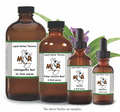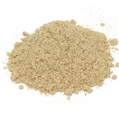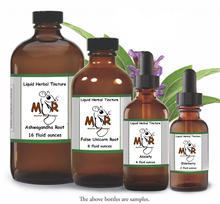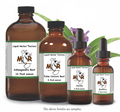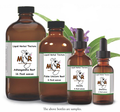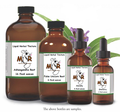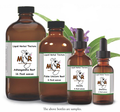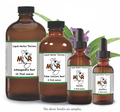 Loading... Please wait...
Loading... Please wait...- Home
- Herbal Tinctures
- Herbal Tinctures - Combination
- Interstitial Cystitis Tincture
- Home
- Herbal Tinctures
- Herbal Tinctures - Women
- Interstitial Cystitis Tincture
Interstitial Cystitis Tincture
Product Description
Interstitial Cystitis Tincture
Frequently, I am asked a myriad of questions from women who are suffering with intense pelvic discomfort as well as women who have the urge to urinate frequently. For a number of women, constant trips to the bathroom control their lives. Some of these women go to the bathroom as often as 60 times a day and 10 times during the night! Numerous women are desperate to minimize an extremely painful, stabbing pain in their pelvis. The good news is that today, women have a variety of avenues they can explore when it comes to these symptoms, a common one; however, often misdiagnosed – a bladder condition called interstitial cystitis (IC), or painful bladder syndrome (PBS) is something I want to talk about.
Interstitial cystitis affects more than 1.2 million people in the United States, 90% of whom are women. Interstitial cystitis can affect women at all stages of life, from puberty to menopause, all of which have unique challenges with this condition. The condition is extremely uncomfortable and leads many women to search for answers. It is important to understand that our hormones, particularly estrogen, play a large role in managing (or even preventing) the inflammation that relates to IC. Even though the symptoms can feel similar to a urinary tract infection (UTI), nobody has been able to identify an infectious agent to date: consequently the condition won’t show up on regular urine cultures for bacteria and other pathogens. Unfortunately, taking antibiotics won’t help either. Nor will drinking more cranberry juice — natural UTI treatments can in fact make IC symptoms worse.
Interstitial cystitis can be downright unbearable for some women, preventing them from going to school, work, or participating in any of their normal day-to-day activities, not to mention making their sex lives very painful. Too often women just “live with it” for years before looking for help. Or a woman could see up to five different practitioners over the course of many years before being accurately diagnosed with Interstitial cystitis! I would like to talk a little bit more about this remarkable condition as well as look at what you can do to protect your bladder — as well as your sanity and over all lifestyle. Many different techniques have been tried but none have a huge success rate to date.
What is Interstitial Cystitis, and why haven’t I heard of it?
The symptoms of IC are easily confused with a wide range of other problems, from bladder infections (UTI’s) and urge incontinence to bladder cancer, endometriosis, STD’s, and kidney stones. These disorders have different root causes and need different types of treatments. A lot of women with IC see their healthcare practitioners thinking they have a UTI and are told their urine is “clean” —that means on culture that no abnormalities were seen in the urine when it was evaluated in the lab. If there is no detected “problem,” it frequently means that there simply is no easy solution for women.
There now exists diagnostic criteria for IC established by the National Institutes of Health Let’s look at what they are:
- Bladder and low pelvic pain
- Urinary urgency and frequency
- Small bladder
- Evaluation for Hunner’s ulcers (only affects about 10% of all cases)
Interstitial cystitis is most often recognized as a chronic neuroinflammatory disorder affecting the bladder — a complex interrelationship between bladder nerves, the immune system, and the urinary tract. Untreated, IC can lead to scarring or stiffening of the bladder walls as well as an inability to hold much fluid in your bladder. Glomerulations, which are identified as hemorrhages in the mucosal lining of the bladder, and can also develop star-shaped sores called Hunner’s ulcers, this is seldom seen in clinical practice.
As more medical professionals learn to identify the IC conditions, they are better able to help women manage as well as overcome this disorder. The Interstitial Cystitis Association and the Interstitial Cystitis Network are wonderful organizations that are promoting more awareness of the varied causes and symptoms so more women can get relief.
Possible causes of interstitial cystitis
We are still learning about IC, and to date there is no known cause that has been identified. There are probably many “insults” to the bladder that could lead to interstitial cystitis. What is clearly understood though is that inflammation is at play, with immune dysfunction, specifically allergies and sensitivities, having a central role. Here are a few possibilities. There does seem to be some ties with autoimmune disorders as well.
Chemicals in urine: Urine itself can be an irritant in the urinary tract, mainly if tissues were previously damaged from other primary causes. Urine will change as the diet changes. Studies show that patients with IC have a molecule in their urine called antiproliferative factor (APF). APF inhibits the normal growth of bladder wall cells, making it problematic for your bladder to repair itself if scarred.
Mast cell activation. Studies have shown that some of the contents found typically in our urine (like potassium, for example) can infiltrate the bladder lining in IC patients, leading to mast cell activation and the release of histamine — which can then result in further damage to the bladder lining and amplified inflammation. More than 70% of women with IC have highly activated mast cells. Again this is an example of the inflammatory system being on high alert.
Previous bladder damage: A number of factors can damage the bladder, making it more susceptible to the interstitial cystitis. Some of which include:
- A history of bladder trauma, especially including pelvic surgery
- Spinal cord trauma
- Pelvic floor muscle dysfunction
- Bladder over distention
- Inflammation of pelvic nerves
- Autoimmune disorders
- History of frequent bladder infections
- Chronically Low estrogen
Interstitial cystitis, estrogen, and menopause
So many women remark that symptoms of IC ebb and flow with the natural hormonal shifting that occurs in our bodies monthly. Furthermore, some notice their first symptoms throughout the perimenopausal time frame. Why, you might ask? Well, it most likely has something to do with estrogen levels. A reduction in estrogen levels can activate our mast cells. Estrogen is an anti-inflammatory agent.
When evaluating bladder mast cells researchers at Tufts who examined the mast cells under an electron microscope also noticed a large number of estrogen receptors in cells from women with IC. The net result in these women is similar to hormones that are imbalanced. They described this as similar to a progesterone deficient state which lead to increased mast cell secretion of histamine. This is the body’s immune response to an offender.
In looking at the bladder’s anatomy, the bladder lining and the muscle that essentially governs urination, the detrusor, are greatly affected by inflammation, mast cell activity, and estrogen. If we have ongoing low-grade inflammation over the course of multiple years, particularly when coupled with significant hormonal fluctuations during perimenopause and menopause, the tissues and muscle can become thinner and drier — and even more susceptible to inflammatory changes. As a result without restoring our hormonal balance, there is a greater chance that we can become more susceptible to IC.
However, women have options when it comes to treating and managing interstitial cystitis. A good place for women to start is by looking at their diet and lifestyle.
Discovering your triggers — an IC elimination diet
Subsequently a lot of women say that their symptoms decrease when they follow an alkalizing, anti-inflammatory diet by avoiding certain trigger foods, and by eliminating caffeine, alcohol and smoking. Tobacco is a particularly common trigger because it constricts the bladder’s blood vessels, making it harder for our bodies to naturally cleanse inflammatory substances from the bladder tissues.
Here are the some of the foods that the Interstitial Cystitis Network calls “the most problematic” because they trigger the most symptoms in the most people. These top offenders are an excellent place to start:
- Coffee. The acid and caffeine in coffee can cause intense irritation and discomfort. Additionally, caffeine acts as a diuretic. Therefore lowering your coffee consumption to 12 oz. or perhaps much less per day is really a wise decision – in fact, a lot of women with IC really need to completely eliminate coffee to feel significantly greater pain relief. Tea. Black teas and even decaffeinated teas can spark inflammation in your bladder. Everyone is different so just trying this for a few days may bring great relief. Green teas and some herbal teas also have a tendency to have a certain level of acidity. Nearly all women are (quite understandably) unwilling to give up their delicious hot drinks, but you can try some other options such as hot water with grated ginger and honey or mint teas containing only peppermint or spearmint leaves.
- Cranberry and other acidic fruit juices. Cranberry juice is actually frequently recommended for the treatment of urinary tract infections, but an IC bladder is extremely irritated from the level of acidity in cranberry juice. So if juice is a must for you, try less acid varieties like pear, apple, and blueberry. Pear juices and pear sweeteners are really considered your safest bet.
- Diet soda. Your average diet soda contains four major bladder irritants in one shiny can: acidic carbonation, citric and phosphoric acids, caffeine, and artificial sweeteners. In case you absolutely need to have a soda pop, we recommend a non-diet, non-caffeinated root beer, and diluting it with ice cubes or water is certainly a lot better.
- Tomatoes. Though they’re full of so many good things, tomatoes are also high in potassium, and are highly acidic, too. For tomato-lovers, low-acid varieties might be substituted as an occasional treat.
A few additional items to this list of top offenders.
In our experience, the following substances also have the potential to trigger symptoms:
- Artificial food colorings (dyes) and flavorings. Food colorings happen to be incredibly common in food (even several health foods) in addition to the majority of over-the-counter multivitamins and prescription medications.
- Foods that promote yeast. Sugar, vinegar, yeast, malt and other foods can cause yeast overgrowth. You may want to follow a yeast-free, sugar-free diet — many of the women we see with IC symptoms are found to have systemic yeast, but once the yeast overgrowth is resolved, the IC symptoms abate. This is almost always an issue when we do the workup for IC.
- Gluten. This problematic, inflammatory protein is found naturally in grains and also in several other foods through additives and contamination. Read our article on gluten sensitivity for more on the effects of gluten and how to address them with a gluten-free diet.
- Certain nutrients. A number of women truly have allergies or severe sensitivities to certain nutrients — which is why you may read advice recommending that women with IC discontinue multivitamins. If you cannot find other causes for your allergic reaction to foods, consider NAET — an allergy elimination technique that has helped countless people overcome problematic allergies and sensitivities.
Once you learn just what foods set you off, you can begin to create a list of your trigger foods. Once you feel a lot better – which frequently will happen in just a week or two – experiment with just how much of each and every food your body definitely will process comfortably. Take heart: even the strictest IC diet doesn’t have to last forever. (The initial dietary changes are about calming down the bladder). But changing to a more alkalizing diet has tremendous overall health benefits for your body, and I know plenty of women with IC who are able to enjoy all of the above foods in smaller amounts!
The Women to Women approach — options for treating Interstitial Cystitis
Presently, there is not a cure for interstitial cystitis; however there are effective treatment options that do exist. Because our bladders can have trouble repairing themselves when we have IC, it is important that women speak with their healthcare practitioner as well as their urologist about the best IC treatment for them.
Here are some options:
- Keep a bladder diary. If you are suffering from very painful bladder, or even more frequency than normal, always keep a personal bladder diary. For 24 hours (or more), jot down what you eat and drink (and smoke), how often you experience the urge to urinate, the level of your pain intensity, and how relieved your bladder feels after urination. You are then able to take your bladder diary with you any time you visit your healthcare practitioner to assist in figuring out patterns and whether or not you could have IC or not. This is one of the only ways for you to see the associations that may not have been seen otherwise.
- Understand your triggers. See the section above on common interstitial cystitis triggers and learn what you can modify in your diet to lessen your symptoms. Everyone is different and has different triggers.
- Follow an IC/alkaline diet. Actively managing the acid–alkaline balance in your body can help all urinary disorders, and lessen your discomfort. It has also helped women cut down on the foods that cause other inflammatory issues in their bodies To start, there are amazing cookbooks that can get you started with some excellent recipes. One excellent resource is A Taste of the Good Life: A Cookbook for an Interstitial Cystitis Diet.
- Balance your hormones. Estrogen plays a significant role in inflammation, and during times of great hormonal imbalances your body could be more susceptible to inflammation that can lead to interstitial cystitis. Consider a natural approach to hormonal balance in your system, such as a soy supplement. Many women also think about more potent natural hormone therapies when needed. In my practice this is almost always something I will start with.
- Investigate anti-inflammatory supplements. For numerous women, calcium citrate can promote a more alkaline system and reduce the inflammation that contributes to issues like IC and vulvadynia/vestibulitis. Also turmeric is a fabulous anti-inflammatory agent along with boswellia. In addition, omega-3s have long been known for their ability to decrease systemic inflammation in the tissue and membranes.
- Probiotics also help restore normal flora and lessen inflammation, plus help to combat systemic yeast triggers. Also, Quercetin, is an antioxidant in the flavonol group with marked anti-inflammatory actions. It is also very effective to decrease systemic allergic responses. Quercetin-containing supplements are exceptionally well tolerated and are reported to provide considerable symptomatic improvement in patients with IC.
- Try physical therapy. Most people with IC also have severe pelvic floor dysfunction, a condition in which the muscles of the pelvic floor do not relax enough to allow easy urination. They also may have alignment issues as well. Physical therapy to rehabilitate the pelvic floor is very helpful in easing the pain of IC, as is bladder “retraining” to gradually expand the time between trips to the bathroom. And a technique called myofascial tissue manipulation and polarity therapy shows promise for reducing IC symptoms.
- Address body and mind. Various women have regular acupuncture treatments or biofeedback to relax the bladder and detrusor muscles. At Women to Women, we have referred patients for education in the Feldenkrais method, and integrative manipulative therapy with great success Guided imagery is also a readily available interventive step with no harmful side effects — in a study on guided imagery published in 2008, IC patients reported significant improvement in pain and IC symptom management.
- Investigate conventional approaches. Based on the seriousness of your symptoms, you could possibly first try less invasive therapies, but if you do not experience improvement, don’t give up hope – nothing is going to help every woman the same exact way. You can always talk to your practitioner about more conventional treatments, and seeing a urologist or uro-gyn specialist who is familiar with cutting edge IC treatments available, such as:
- Oral medications. Antidepressants can block pain for a number of women. These medications seem to work by interfering with nerve activity, and their effect may also prevent psychological stress, which can activate mast cells. Stress can be a significant aggravator. A number of researchers are developing treatments based on AFP, such as the prescription medication Elmiron, which “coats” the bladder wall to protect it, thereby reducing irritation and inflammation. Numerous experts now believe you can just start a trial of this medication based on symptoms, without need for painful cystoscopy testing.
- Bladder treatments. A number of women with especially severe cases of IC have treatments that include bladder distensions (stretching the bladder during a cystoscopy), or by inserting drugs that inhibit inflammation and pain into the bladder through a catheter. Heparin and even Elmiron can be used in this manner.
- Surgery. For women who cannot get pain relief elsewhere, surgery to expand the bladder remains a last resort — but since so many women find success treating their IC in other ways, surgery is fortunately uncommon.
Get out of the bathroom and back to your life!
There are certainly choices for you when you have interstitial cystitis. The first thing I recommend that you do is to talk to your healthcare practitioner about a combination of natural approaches that would work best for you, along with the IC diet in order to seek relief. Because with the right treatments, whether naturally and holistically, or through conventional medicine, the majority of us can learn how to manage our IC symptoms well enough to get out of the restroom, and back to our lives!
IC is often misdiagnosed as…
- Urinary tract infection
- Vaginitis
- Urge incontinence
- Chlamydia, herpes, and other STD’s
- Kidney stones
- Endometriosis
- Bladder cancer
Features and description:
- NON GMO!
- Gluten Free!
- Highest Strength tincture!
- Contains ONLY natural ingredients!
- We use classic conventional methods of extraction! We meticulously produce our extracts according to precise standards where each herb is extracted according to the distinct characteristic of each plant!
- We only use Only Certified Organic or ethically sourced wild harvested raw material, organic grade alcohol, and do not add water!
Ingredients:
- Golden seal root due to its berberine content to provide healthy bacteria to the urinary system
- Slippery elm powder may help to soothe the lining of the urinary tract
- Echinacea and Olive leaf may support the underlying immune system weakness and is also an anti-bacterial
- Marshmallow is a herb used for soothing irritation to the mucosal linings of the urinary tract
- Spirulina or Chlorophyll is a blood alkaliser which may reduce inflammation, acidity and pain
- Buchu, Horsetail and Cornsilk strengthen the urinary system and prevent degradation of the urinary tract wall
- Certified Grain Alcohol.
- Black Haw Bark is a powerful relaxant of the uterus and is used for dysmenorrhoea, false labor pains as well as in threatened miscarriage. Black Haw's relaxant and sedative actions are taken advantage of in its use in reducing blood pressure in hypertension. Its anti-spasmodic properties makes it a viable treatment for asthma.
Suggested: Use 10-12 drops in juice or water, under the tongue or as directed by your practitioner. May be taken 3 times daily. Shake well. Store in cool dark place. Keep out of reach of children.
Precautions - If you are taking any other herbs or supplements please consult with a qualified healthcare provider before starting any new regimen. If you are pregnant or breast feeding, consult with your physician before taking.
Before Using:
Tell your doctor if you
- are taking medicine or are allergic to any medicine (prescription or over-the-counter (OTC) or dietary supplement)
- are pregnant or plan to become pregnant while using this medicine
- are breastfeeding
- have any other health problems, such as high blood pressure or heart or blood vessel disease
Disclaimer - These products are not intended to diagnose, treat cure or prevent any disease. Reviews are not intended as a substitute for appropriate medical care or the advice of a physician or another medical professional. Actual results may vary among users. Mountain Maus Remedies LLC makes no warranty or representation, expressed or implied, as to the accuracy or validity of the information contributed by outside product review submissions, and assumes no responsibility or liability regarding the use of such information. The information and statements regarding the dietary supplements have not been evaluated by the Food and Drug Administration. If you have a medical condition or disease, please talk to your health care provider. If you are currently taking a prescription medication, you should work with your health care provider before discontinuing any drug or altering any drug regimen, including augmenting your regimen with any herb or dietary supplements. Do not attempt to self-diagnose any disease or ailment based on the reviews and do not use the information contained herein for diagnosing or treating a health problem or disease. Proper medical care is critical to good health. If you have a health concern or suspect you have an undiagnosed sign or symptom, please consult a physician or health care practitioner.
© Mountain Maus Remedies. All Rights Reserved
Information provided by https://www.womentowomen.com/urinary-incontinence/interstitialcystitis/







